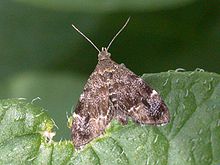Brenthiinae
| Choreutidae | |
|---|---|
 |
|
| Nettle-tap moth | |
| Scientific classification | |
| Kingdom: | Animalia |
| Phylum: | Arthropoda |
| Class: | Insecta |
| Order: | Lepidoptera |
| (unranked): | Ditrysia |
| Superfamily: | Choreutoidea |
| Family: |
Choreutidae Stainton, 1854 |
| Subfamilies and genera | |
|
|
| Diversity | |
| 402 species | |
Choreutidae, or metalmark moths, are a family of insects in the lepidopteran order whose relationships have been long disputed. It was placed previously in the superfamily Yponomeutoidea in family Glyphipterigidae and in superfamily Sesioidea. It is now considered to represent its own superfamily (Minet, 1986). The relationship of the family to the other lineages in the group "Apoditrysia" [1] need a new assessment, especially with new molecular data.
The moths occur worldwide, with 19 genera in three subfamilies defined by the structural characteristics of the immature stages (larvae and pupae), rather than the characters of the adults (Heppner and Duckworth, 1981; Rota, 2005).
These small moths often bear metallic scales[2] and are mostly day-flying (some also come to lights), with a jerky, pivoting behaviour, and may fluff up their wings at an extreme angle. Some tropical exemplars such as the genus Saptha are quite spectacular, with bright green metallic bands [3]. The members of the genus Brenthia, usually placed in their own subfamily Brenthiinae, have eyespots on the wings and have been shown to mimic jumping spiders (Rota and Wagner, 2006).
...
Wikipedia
